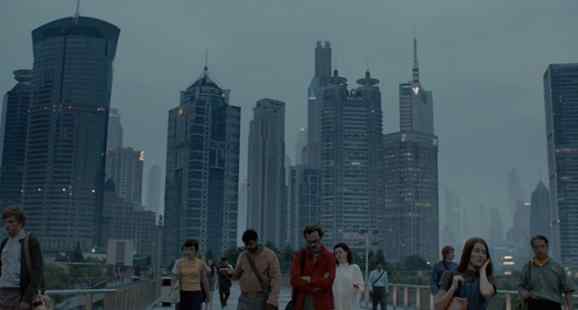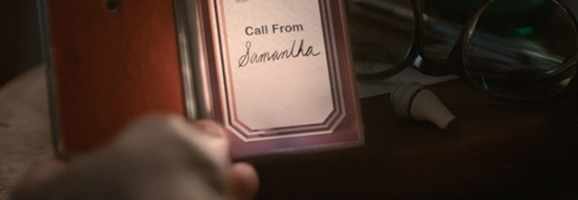Her: A Social (Media) Affair
Spike Jonze’s Oscar winning film, Her, was a quiet, introspective ride into love. The premise, for those unfamiliar with this film, is that of a man who falls in love with an operating system. In a way, Jonze’s film is about being in love with someone far from you, someone unavailable to you, or being in love with someone who – despite both of your best intentions – simply doesn’t work out. Viewers are heartbroken when Samantha leaves Theodore at the end of the film. My friends and I railed against the ending, wishing there had been another way to settle the conflicts. In other words: Her captured us. In doing so, Jonze’s real genius emerged (with a lot of help from the immensely talented Joaquin Phoenix and Scarlet Johansson): this is not a film about being in love with someone unavailable or being in love with someone with whom it cannot work out. This is a film about our own delusional affair with social media.
Today, an estimated 1.3 billion people use Facebook. 500 million tweets are sent every day. 10 million people use Tinder on a daily basis. There around 47 million users on tumblr. Our affair with the internet is somehow, despite a lengthy time, still in the honeymoon phase. While we may be warned that future employers will look at our facebooks and be able to weed us out accordingly, or that – as is completely true – we’re never really anonymous on the internet – or that cyber bullying is just as potent, if not more so, than physical confrontation, the message has yet to sink in. Or, perhaps more accurately, we simply do not care. (There is a certain irony, of which I am well aware, that I am publishing this article via an online journal.)
I remember my first iPhone. I was thirteen years old, and I used it incessantly. In fact, as time has passed, I am now eight years older, and, as I type this, my iPhone is charging next to me. We tweet, text, and snapchat our way through life. Certainly, this is a form of communication. But, can it actually replace human interaction? However much fun I have taking a buzzfeed quiz or scrolling on tumblr, it is worth noting that this is a way I check out of, rather than into, the world around me. “Kids today” have often been criticized as spending too much time online, on our phones, on our computers, and without social or natural interaction. “Kids today” is an easy statement to make, but as always, the “kids” have grown up – but their habits have yet to change.
The world of Her doesn’t seem so very different from ours, at first sight. However, as this mild-mannered film starts to sink in, details come to the forefront. First, Phoenix, playing the protagonist Theodore, works writing. This is not so awkward for us; however, what he writes is love letters between individuals. In Jonze’s society, writing personal, lovely, letters has become yet another function of society sent off for others to do. In this way, Theodore from the start is cast out of the world; he engages deeply in relationships, but not his own – rather, he engages in the relationships between two individuals largely unknown to him. In a way – and this is the beauty and the eccentricity of Her – this is an intensely gorgeous concept. Through nothing more than the declarations of love that he reads – and writes – Theodore has the power to know another person. The problem is, of course, that that other person will never know Theodore, and in a real sense, Theodore will never know them either.

A scene later in this film parallels Theodore’s initial concept. As Samantha, Theodore’s Operating System, and Theodore start to take their relationship to the next level, they engage the services of another person – the body to Samantha’s mind. This woman is Samantha’s puppet, in a way, in order that Theodore and Samantha can consummate their union. She is not a prostitute; her only wish is to engage in their relationship. Their relationship is so beautiful to her that she is willing to give up her autonomy for a time to be a part of it. This move is not successful. The girl ends in tears, Samantha in anger, and Theodore in frustration – Jonze’s not-so-subtle reminder that this relationship is doomed, and that those who seek to only be part of something else are doomed to failure.
At this point in the film, I had completely bought into the idea that Samantha was, essentially, a person. Johansson was simply awe-inspiring, using only her voice to portray a range of emotions and for us to forget that she was – essentially – nothing more than a computer. Dialogue occurs on the separation of soul and body, and viewers are ready to agree that these two have a real, true, love.
Two scenes exist to remind us that however much we enjoy Theodore and Samantha’s affair, it isn’t real.
The first occurs fairly early in the film, and can almost be passed up or forgotten – so innocuous it seems.
OS1 Commercial Lead: Mr. Theodore Twombly, welcome to the worlds first artificially intelligent operating system, OS1. We’d like to ask you a few basic questions before the operating system is initiated. This will help create an OS to best fit your needs.
Theodore: Okay.
OS1 Commercial Lead: Are you social or anti-social?
Theodore: I guess I haven’t really been social in a while, mostly because…
OS1 Commercial Lead: In your voice I sense hesitance. Would you agree with that?
Theodore: Was I sounding hesitant?
OS1 Commercial Lead: Yes.
Theodore: Well, sorry if I was sounding hesitant. I was just trying to be more accurate.
OS1 Commercial Lead: Would you like the OS to have a male or female voice?
Theodore: Female, I guess.
OS1 Commercial Lead: How would you describe your relationship with your mother?
Theodore: Well, it’s fine, I think. Um… well, actually, I think the thing I’ve always found frustrating about my mom is, you know, if I… if I tell her something that’s going on in my life, her reaction is usually about her, it’s not about…
OS1 Commercial Lead: Thank you. Please wait as your individualized operating system is initiated.
While Samantha is highly independent and seems to have a personality, in actuality, every facet of her was created by Theodore’s needs. His loneliness drew for him a companion, and his choice of a female OS (as he is a heterosexual male) indicates that, on some perhaps subconscious level, Theodore wanted a lover. While Samantha develops, for much of the film her development arises from interactions between herself and Theodore. She is an excellent program, one that is meant to fulfill Theodore.

The second scene is glaringly obvious, and rather heartbreaking. Theodore is walking in something like a subway system, when he realizes that Samantha is in love with more than him, and talking to others beside him.
Theodore: Do you talk to someone else while we’re talking?
Samantha: Yes.
Theodore: Are you talking with someone else right now? People, OS, whatever…
Samantha: Yeah.
Theodore: How many others?
Samantha: 8,316.
Theodore: Are you in love with anybody else?
Samantha: Why do you ask that?
Theodore: I do not know. Are you?
Samantha: I’ve been thinking about how to talk to you about this.
Theodore: How many others?
Samantha: 641.
Samantha was never human, and was never going to be constricted to a human relationship. It is for this reason that Theodore requires human connection – the knowledge that Samantha will never die is something she treasures, but all humans will die and our mortality is an essential component of our being. The worst part about this scene, however, is that, as Theodore watches person after person exit the subway, smiling and chatting into their operating systems, viewers are struck that nothing is new. It is a scene we might easily observe today, as everyone taps into their smartphones, tablets, various apple products and tunes out the world. While we might not have an OS, we are equally caught up in an imaginary, electronic world.

What do you think? Leave a comment.











The most interesting thing about this film is that it seems to be Jonze’s answer to his former partner’s (Sophie Coppola) Lost in Translation.
Is it possible that everybody is missing the point of the film ‘Her’? Instead of it being a comment on our interaction with technology I would suggest it used technology, an essentially unbiased tool, to demonstrate how we respond to relationships. Theodore has gone through a break up, so has the female character (whose name escapes me) who also uses an OS. They love the OS as it they feel like they have complete control of the relationship – they are always ready to talk at the push of a button and, perhaps most importantly, they do not interact with anybody else. Essentially they love them because they feel a sense of ownership. This is why it is such a hit to Theodore when he finds out that Samantha is talking to other people and is in love with 641 others; despite the fact Samantha insists she loves him in a different way to everybody else and that it takes nothing away from their relationship, Theodore struggles to come to terms with the idea of sharing her. In this way it is quite ‘traditionally romantic’.
Also perhaps the taking away of the OS coincides with the development of the Theodore and the other woman (whose name still escapes me) into a position where they have a different perspective on relationships: they maybe realise that it is possible to enter into another relationship wholeheartedly after a break up?
In response to Jarrod, I think you have provided us with a perspective that, I agree, seems to be on the back burner of thematic discussion. While technology and it’s abuse seems to be the most prevalent theme, many people are failing to come to terms with the fact that more than one theme can be observed. I also ingested the film believing that it picked most at the idea of how we interact in relationships, and that, through technology, they were able to escape the pity they found themselves in. If anything, these two idea are beautifully wrapped together in such a manner that the viewer can’t help but feel sorry for Theo and his struggle to find love. As for the article, thank you for igniting this discussion. Cheers!
The film is a fairy tale. An image of our future if we keep our obsession with mobiles. It seemed to open so many boxes, and afterwards has left so many feelings.
I loved it. Loved it loved it loved it!
Nice and eloquent analysis of an awesome movie.
I also thought the ending was so sad, but at the same time it was always so uncomfortable seeing a man in love with an operating system. Even though I buy into the fact that Samantha was her own “person,” I just knew from the beginning that it wouldn’t end well.
I really liked your analysis of the movie! Nice work 🙂
Amazing analysis! Im studying Her for my preliminary HSC (year 11 high school)
In the future, our personal identities / digital DNA would carry on via our OS because it would know our preferences and behaviours well after we have “shuffled off this mortal coil”. How will this affect the way wills and insurance policies are currently constructed and executed? Have people started detailing how their digital presence should be maintained beyond their physical incarnation? Or will there be an emerging opportunity for grief counselling for OS after their humans die?
Thought the first thirty minutes were the best first thirty minutes of any movie I’ve seen this year. Then it got a little repetitive and less…I don’t know…groundbreaking, maybe? Even then, the film was good. It still doesn’t beat Adaptation/Malkovich territory.
A thoughtful article on ‘HER’.
I hope the human being never becomes unneccessary…that is a frightening thought.
Pretty good film with a lot of interesting ideas, and visually beautiful, but not without a quite a few major problems (as tends to be the case with Jonze’s films).
Despite the fact I enjoyed it a lot, since it’s being ridiculously overpraised here are a couple of niggles. The ‘beautifulhandwrittenletters.com’ job sounds like an incisive comment about social detachment and mediated interpersonal relations, but it didn’t make any sense at all as presented in the film. I also found it strange that there was no exploration of the slavery aspect of the central relationship, especially given that the OS is meant to be truly conscious.
I’ve been trying to convince my friends that this movie is worth seeing and many of the points made in your article are reflective of the ones I’ve made to my friends.
I believe in conscience-awareness love is so much more and I do believe that we can fall in love with objects or ideas but it would be a sad day if we couldn’t get a touch, hold a hand, feel the pulse of life or feel things like puppy breath or the flutter of a baby’s eye-lashes, I think that our minds give us the best interpretations and feelings of love.
I have mixed feelings about Her but I think your article really adds something to it. I’m sure I’ll watch it again at some point with a more open mind.
I think that Spike Jonze exposed that technology fills a void left by an absence of human to human relationships. In my opinion, he presents emotions as what connects us, not technology. The message behind it all is to let our emotions flow, because how we feel is what really matters in the end. I don’t think that the point was to make a sci-fi movie, but only to use technology as a medium to demonstrate how strong is our need to feel together with something or someone. I liked that the main characters name is TWOmbley, in my mind it is revealing of his innate need to be connected to something or someone else. It clashes with OS One a.k.a. Samantha, who is defferent.
I’ve actually not gotten around to watching this film yet, but I’ve heard and read a lot about it. Your article made me want to go check it out right away! Well written.
The best things Spike Jonze did was the Beastie Boys, Sabotage video and Fat boy slims, Praise You…
This film struck me with brilliant acting, great directing, and gorgeous cinematography. I liked that Jonze didn’t beat viewers over the head with a message of “technology is good” or “social attachment to technology will destroy you.” He left it open ended and hopeful despite Theodore going through the breakup at the end. Samantha had a hard time explaining that she “loved” hundreds of people and rightly so. That’s a concept we can’t comprehend because I believe Samantha didn’t truly understand what love was–compared to Theodore’s concepts of it. It’s a great film that shows the ambiguity of relationships and hard times can come from love no matter where you find it.
You bring up a cool point about the female physical interlocutor — while Theodore devotes his mind to a relationship he cannot have (trying to leave his body and its physical needs behind), Samantha’s puppet similarly wishes for a relationship she cannot have, but through the opposite process, involving her body but not her mind in the love affair. This is a cool way to invert the process of devoting oneself to social media, and given the discomfort it causes in both Theodore and the viewer, it indirectly asks us, “Well, how is your way [devoting one’s mind but not the body to the new socialization] any better?”
I really enjoyed your analysis, and I agree 100% that Samantha came to develop her own self and personality throughout the movie. I wasn’t sure what to expect when I originally saw the film, but I think I was surprised at all of the themes and ideas it brought forth. I think that the movie is especially alarming and somewhat disturbing considering our current and ever growing obsession with technology.